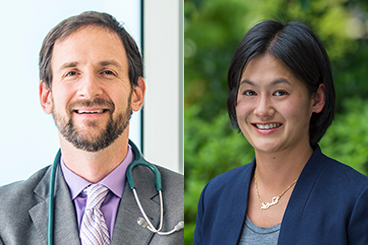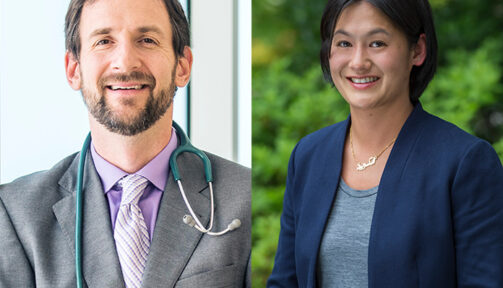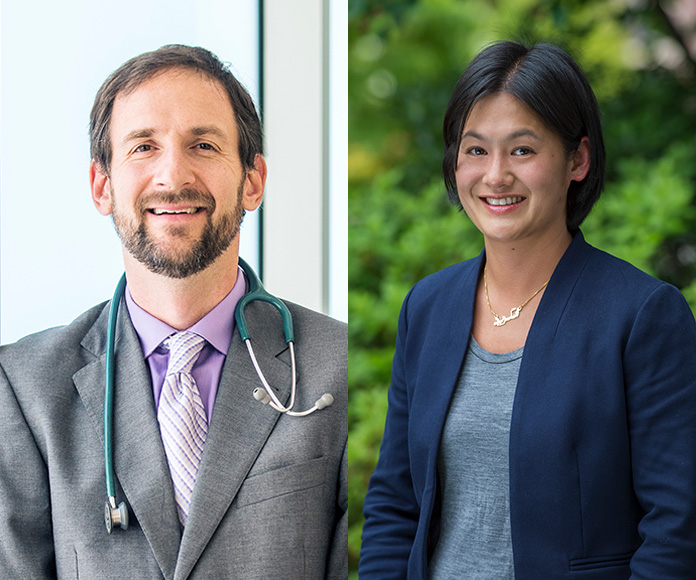
The Institute for Global Health Sciences has named new leadership for its Master of Science in Global Health program: Christopher Carpenter, MD, MPH, an associate professor of pediatrics and IGHS faculty affiliate, will serve as director; and Ingrid Chen, PhD, MS (’13), an assistant professor of epidemiology and a core IGHS faculty member who works with the Malaria Elimination Initiative, will join Alden Blair, PhD, MS, as a second associate director.
Madhavi Dandu, MD, led the program as associate director and then as director from 2013 until this June, when she became director of the UC Global Health Institute.
“IGHS deeply values its educational programs, and we are thrilled to welcome these two passionate educators to shape the master’s program moving forward,” said Executive Director Jaime Sepulveda MD, DSc, MPH. “We’re also very grateful to Dr. Dandu for the incredible work she has done for our students and faculty in her contributions to this program over nearly a decade.”
After Carpenter completed his pediatric hospitalist residency at UCSF in 2008, he went abroad to do global health work. He worked in the Democratic Republic of the Congo and completed a Global Health Fellowship with Harvard, Boston Children’s Hospital and Partners in Health in Haiti. In Haiti, he also established the Kay Mackenson Clinic to serve children with chronic, non-communicable diseases, including diabetes and heart disease. Open 24 hours a day and run entirely by Haitian doctors, nurses and support staff, the clinic invites children to stay as long as they want or need to learn how to manage their conditions.
Since Carpenter returned to UCSF in 2013, he’s been looking to do more with global health.
“It’s been a lifelong dream to get back into mentoring and teaching students in global health,” he said.
In his new role, he will devote half of his time to the MS program and half of his time to his clinical work caring for hospitalized kids at UCSF Medical Center. As director, Carpenter will work to expand the career-related mentorship students receive.
“With the MS program, the global health world is our oyster: Students can go into program management, qualitative or quantitative research; they can go into domestic and international pursuits, at the San Francisco VA system or in rural Malawi,” he said. “I’d love to enhance our career guidance and mentorship to help the students achieve their individual career and personal goals.”
Incoming associate director Chen came to IGHS as an MS student in 2012, hoping the degree would allow her to broaden the research repertoire, building on a UC Berkeley PhD in chemistry. Chen took full advantage of the program, exploring a wide range of research efforts, and stayed on after her degree, first as a postdoctoral fellow and, since 2017, as faculty.
Chen, who stepped down as co-chair of IGHS’s Diversity Equity and Inclusion Committee to make time for the new role, noted the importance of education in the mission of decolonizing global health.
“I want to bring people from the countries that we represent in our institute into the program,” she said. “I think it’s a critical component of DEI – our in-country partners tell us they want to gain knowledge from us that they can take back to their home countries. I want to look into how we can fund people from those countries because they can’t afford to come here otherwise.”
Drawing on her experience as a student in the program, Chen also said that the diversity of students’ backgrounds is an important asset.
“When I was in the program, our cohort had so much life experience. We’d be arguing in class about the best way to do something, it was amazing and compelling, and later I also realized that this is how many major decisions in global health are made,” she said. “We’ll be thinking a lot about who we’re recruiting.”
The new leadership and everyone at IGHS are looking forward to meeting the 32 new students from 11 countries who make up the 2022-’23 cohort when classes begin next week.

